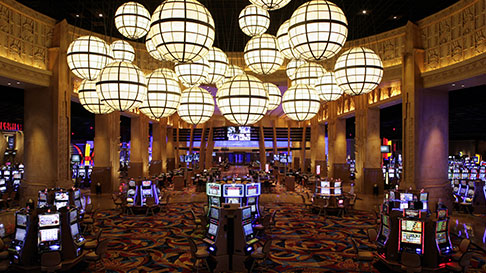Slot slots, featuring its vibrant designs and alluring music, has become a common type of entertainment for a lot of people. The thrill of levering a lever or pushing a button can create an exhilarating experience, drawing players into a realm where dreams of winning big often capture attention. However, underneath the flashy surface lies a more ominous reality that can lead to a downward spiral for a significant number of gamblers. The journey, while seemingly harmless at first, can quickly transform into a quest that depletes not only finances but also psychological stability.
As players grow more invested in their quest for that hard-to-get jackpot, they may find themselves pursuing losses, believing that a bigger win is just about to happen. This perspective can entangle individuals in a never-ending loop, causing them to gamble more in the hopes of getting back what they have wasted. The hidden aspects of slot gambling reveals how quickly one can become entangled in a network of obsession and desolation, highlighting the necessity for greater understanding and insight of its potential risks.
Understanding Casino Slot Machines
Slot machines have become a popular type of recreation in gambling establishments worldwide, drawing in gamblers with their vibrant displays, captivating auditory effects, and the thrill of maybe hitting a jackpot. These machines work on RNGs, ensuring that each spin is independent and random. This design creates an engaging experience, often causing players to think they have a shot of striking it rich, despite the odds being significantly unfavorable.
The core functionality of a gambling machine are easy to understand: players put in funds, select a wager size, and rotate the drums. Each device offers different concepts, paylines, and special functions, contributing to the variety and thrill of the play experience. With the growth of virtual casinos, gamblers can now experience slots from the convenience of their homes, further boosting their favorability. However, the ease of internet slots can lead for gamblers to not monitor their losses.
Grasping the mental processes behind these devices is important for understanding their habit-forming potential. Many gamblers are captivated by the unpredictability and suspense associated with all spins, which can lead to a pattern known as "recovering losses." This action occurs when individuals continue to play in the belief of recouping their losses, often causing to further deficits and financial distress. It is important for gamblers to be conscious of their boundaries and manage gambling on slots with prudent judgment.

Understanding the Psychology Behind Loss Chasing
Pursuing deficits can be a frequent mental occurrence among slot gamblers. When individuals experience a losing period, the emotional impact can be significant, leading in emotions of discontent and hopelessness. This response often drives them to keep playing in hopes of recouping their losses. The urge to recover lost money can supplant logical thinking, pushing individuals deeper into a pattern of escalating bets and heightened danger.
The mind plays a crucial part in this conduct. Gamblers may feel a surge of elation when they achieve a win, which strengthens the belief that they can turn around their losses through additional gambling. This "almost win" phenomenon, where a player almost succeeds, can also lead to greater resolve to persist in gambling, despite the mounting losses. Feelings like hope and determination can entrap players, rendering it challenging for them to recognize the diminishing returns of their efforts.
Additionally, social influences and common stories around luck can exacerbate this tendency. Many gamblers believe in "getting lucky" or that a substantial win is just around the corner. Such beliefs can prevent players from acknowledging the reality of their losses and lead them to pursue after false gains. As a result, slot gambling can turn into a dangerous path, where the desire to retrieve money leads to even greater losses and an eventual disconnect from actuality.
Effects of Gambling Addiction
Betting dependence can lead to significant monetary issues, as individuals often find themselves trapped in a cycle of chasing losses. This unending pursuit can result in massive debt, causing tension and worry that can permeate all facets of life. slot mahjong ways As gamblers spend more funds trying to make up for losses, they may deplete their savings and even resort to borrowing or theft, leading to a negative spiral that can be hard to break free from.
The impact of betting problems extends beyond financial issues; it can seriously damage personal relationships. Friends and family may feel overlooked or betrayed as the gambler places above all their addiction over significant connections. Trust often breaks down, leading to feelings of loneliness and despair, which can further exacerbate the addiction. Family members may struggle to understand the behavior, causing divisions that can take years to mend.
Moreover, the mental health consequences of betting dependency cannot be overlooked. Many individuals face increased levels of anxiety, depression, and stress as they grapple with their addiction. The combination of these emotional burdens can lead to a vicious cycle, where the gambler seeks solace in more betting as a way to cope with their feelings. This struggle can result in long-term psychological issues, making recovery a difficult and complicated process.